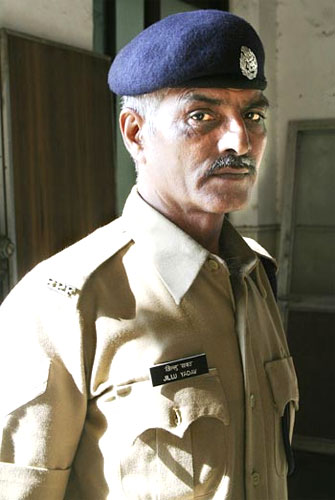
 When terrorists attacked the outstation area at Mumbai's [Images] Chhatrapati Shivaji Terminus [Images] on November 26, Jillu Yadav did not have a weapon.
When terrorists attacked the outstation area at Mumbai's [Images] Chhatrapati Shivaji Terminus [Images] on November 26, Jillu Yadav did not have a weapon. But Yadav, a constable of the Railway Police, grabbed a .303 rifle from a colleague and fired at the terrorists. He then threw a chair in their direction. The terrorists he was firing at were armed with AK-47s, grenades and had killed almost 60 people at the station by then, Yadav knew he was under-equipped, but he took them on with whatever was at hand.
At the suburban train station railway announcer Vishnu [Images] Zende continuously urged commuters to clear the station and ensured that the platform was vacant by the time the killers crossed over to the suburban station where Yadav was stationed.
On the empty concourse, it was the Railway Police pitted against the killers. This is an account of that fateful night in Jillu Yadav's words:
I have been with the Railway Police for 30 years. I was at the platform when the terrorists walked in from the main station side. I did not have a rifle, but another colleague next to me had one. So I took his rifle and fired. The second time when I tried to fire, the rifle got jammed. I gave the gun to him, picked up a chair and threw it at the terrorists.
They were firing back at me with automatic weapons, so I had to hide. I threw a chair at them to distract them, and they again fired at me. I hid behind a pillar which saved my life.
As the terrorists moved ahead, I tried to follow them taking protection behind one pillar after the next. I followed them till they left the station.
Then I heard them firing outside the station. I also heard their firing being returned. I knew the Mumbai police was fighting back. We stayed inside the station.
After they left I realised I was sweating profusely. I went and sat in a corner. It took me some time to get a hold of myself.
In my thirty years of service, such an incident was a first. This is the first time I had faced bullets.
I got the job with the Railway Police when I accompanied a neighbour who was going for an interview for the Railway Protection Force. I was selected and joined as a constable.
I am now a head constable. We do not carry arms on duty all the time but weapons are given to us depending on the nature of the duty. When we guard cash or mail, we carry arms. We also carry a weapon when we are deputed in trains. Machine guns are provided in a sensitive posting.
The incident changed my life. Now I am more alert. I have realised that anything can happen at any time. That day I had no inkling of what was in store for me. I reacted instinctively. If I had thought I would not have been able to act. When a man thinks, he cannot act.
I still carry a baton. But there are heavily armed policemen all over the station. You can see them everywhere. I don't need weapons.
There is a tendency in our country to lower the guard a few months after every incident of terror. This time we will ensure that doesn't happen. We will never lower our guard. We will always be on high alert.
That day will always be on my mind. I will never forget it. That will keep me alert.
I have a wife and three chiildren back in my village. For three days after the incident I did not mention what happened to my family. When my children saw the firing on television, they called me. I told them that I was in my office and far away from danger.
After three days when they saw me on television, they knew what had happened. My wife called me and started crying. She was upset that I had not told her. She said, 'Why did you go in front of them to die? What would have happened to us?'
I told her, 'These things happen when you are on duty. There is something called duty. I had to keep the respect of my uniform. Looking after the public is our duty. That was what I was doing.'
Even my children and cousins said I should not have done that. They told me you should have thought and then acted. What will they understand? They have never worked in the defence forces. I am happy with what I did and will do it every time if the need arises!
Photograph: Uttam Ghosh
